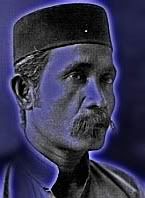FIve O'Clock Shadows
I was in the valley of the shadows of hotels recently with a man I respect greatly, Pok Ku, eating, would you believe it, kerepok lekor. Very Mat Sprong, very KLCC. Half expecting to hear the sound of distant trumpets, strumming guitars and the soft lilt of R.Azmi coming from a steam-powered transistor radio, I looked up to see not the person of Cik Kaleh — Mat Sprong's trishaw man and his eyes and ears in Kuala Trengganu — but the hurried gait of Pak Adib, bearing the weight of many thingamanythings, and apologising for having been detained in a meeting at the Selangor Club.
Been detained at the Selangor Club? Now, that strikes a chord. When I was in town the last time but one, I was sitting there with my retired boss, who was probably the last great editor of our once famous national broadsheet newspaper, listening to him reminiscing about his cycling days to cover proceedings in the Dewan Rakyat then rushing back to look not at notes but into the recesses of his memory to write a 'story' as we called it. Then he'd regurgitate many anecdotes about old stalwarts in days when old stories were melted line by line in a cauldron of boiling lead, then recycled into fresh rows of type metal of today's stories.
Been detained at the Selangor Club? I've been detained there ever since, thinking what a quaint old world this once was, cycling to work, typing 'stories' in top copy and two 'carbons' on finger-powered typewriters, when there was the Spotted Dog and Hash House Harriers. My old boss is long dead now, but I can hear his voice still, and I still remember sitting with him at his favourite seat, looking out into the Padang and at the old Moorish ramparts that presumably kept the plebs safely on the other side.
How life unfolds and unfurls, one into another. Now we were sitting in a valley of hotels, eating kerepok lekor, soon to be joined by the delightful Honeytar, fresh probably from another ten million ringgit deal. In his last episode Mat Sprong was eating much the same thing, in the shadow of a famous Kuala Trengganu institution, Pak Awang Hitam, the kerepok lekor frier and chili dip maker extraordinaire. If I'm not mistaken, Pok Ku once said somewhere that he grew up in a house in Kuala Trengganu that was just a stone's throw (not that I'm accusing him of having thrown any) from Awang Hitam's famous kerepok lekor verandah.
I've known Pak Adib many years, and it was he who gave me the blogging itch. He once walked out on me as I was eating couscous in a restaurant in the quatrier Latin of Paris, but he promptly came back to pay the bill. Then when I took him up to the rooftop of the Institut du Monde Arabe for some baklava and mint tea, he said he was feling giddy from looking at the flying buttresses of the Notre Dame from such a height, and wanted to go back down to earth. Pak Adib is like that, a man never comfortable in the clouds, feet firmly in terra firma.
Thank you friends, for the time for tea.

